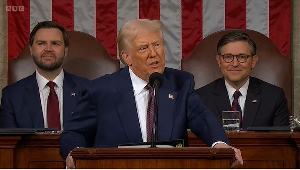Koforidua, Jan. 29, GNA - The National Board for Professional and Technician examinations (NABPTEX) is to select six Polytechnics for a three-year pilot Industrial Practical Attachment (IPA) project that would post students of vocational/technical and professional programmes to workplaces for their attachment instead of the present system whereby the students search for the places themselves.
The project, which is expected to begin by the end of this academic year, would affect the first and second year students of the selected Polytechnics.
The Executive Secretary of the NABPTEX, Mr. K. Antwi-Boasiako, announced this at the 9th Matriculation ceremony of the Koforidua Polytechnic on Saturday.
According to him, the Board was in discussion with stakeholders, including the Ghana Employers Association, the Association of Ghana Industries and the Ghana National Chamber of Commerce and Industry to ensure that through the new arrangement, training of all vocational/technical and professional students would be more practical to prepare the graduates for the world of work.
Mr Antwi-Boasiako announced also that last June, NABPTEX participated, for the first time, in the conference of the International Association of Educational Assessors (IAEA) as a way of seeking international recognition so that its certificates would be recognized all over the world
The Executive Secretary, further announced that NABPTEX, in collaboration with industry, professional bodies and academia, was reviewing the HND programmes to make them respond to the needs of industry.
To this end, he said, in September last year, experts from industry were assembled to develop competencies for the various programmes so that competency-based training could be introduced in the country's polytechnics as done elsewhere.
Mr Antwi-Boasiako reminded the students that the polytechnic was meant to prepare them for middle-level manpower and therefore, "do not use the polytechnic as a type of A-Level education, whereby after completing the HND, then you want to enter the University even at Level 100."
He said they were to be given entrepreneurship training to prepare them to set up on their own business, "so that you don't join the unemployment queue."
The Principal of the Polytechnic, Dr Henry Appiah, announced that a total of 682 freshmen and women were admitted into the Polytechnic this academic year.
He said for the first time, the Polytechnic admitted some students for Motor Vehicle Technician Three, Cookery and part-time HND in Accountancy and Marketing.
Dr. Appiah was happy that the Polytechnic was gradually developing in terms of infrastructure, adding that an 18-unit classroom complex had been completed, a second 12-unit classroom lecture theatre was at advanced stage of completion while the Engineering Block was almost ready and the administration block was at the roofing level.
On staff accommodation, he said six out of ten bungalows had been completed and hoped the Ghana Education Trust Fund (GETFund) would allocate adequate funds for the completion of the projects to help solve the serious accommodation problem facing staff and students.
He announced that the Polytechnic had given approval to four members of staff to develop their careers in post-graduate programmes abroad, while four others were doing so in local universities as part of its staff career development programme.
Dr Appiah said in pursuance of government's determination to improve the lot of the Polytechnics, the Polytechnic had joined the beneficiaries of the Teaching and Learning Innovation Fund (TALIF), the Nuffic and Spanish Grant Schemes.
Under the TALIF, the Polytechnic had been allocated with 57,276 dollars for various courses, including the development and introduction of Information Communication Technology (ICT), while 66,876 dollars was also allocated to it for the establishment of the School of Technology, Phase One.
He advised the matriculants to study hard, now that there were improved facilities, be disciplined and avoid confrontation with the authorities as the Polytechnic would not countenance insubordination. Dr Appiah called for improved conditions of service for the staff to avoid strike actions experienced last year, while the student leadership should resort to more diplomacy in the solution of issues of concern to them.
Regional News of Saturday, 29 January 2005
Source: GNA
















